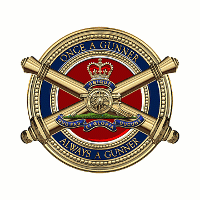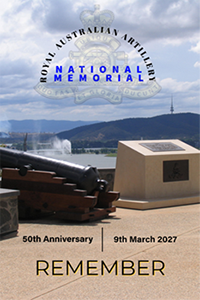Typical of the British Army service in those times, he also enjoyed postings in Singapore, Borneo, Northern Island, Scotland, Canada, Germany and, of course, the UK. Of them all, Germany had the fondest memories because it was there that he met and married Birgit in 1974. Described as 'that even greater woman behind a great man', Birgit bore them two beautiful daughters, Natja and Michelle and there was never a prouder or more loving father.
Determined not to follow in his father's footsteps, he successfully created a style of his own. He 'was the general that the British Army never had' (Richard Anderson RA), he 'never had an unkind word to say about anybody' (Lieutenant Colonel Mike Nicholson RA); 'he got stuck into Mess rugby as well as the naughty water' (Gerald Moor RA); and 'Maude's . . . was the happiest battery in the Regiment, and it was run with style and sensitivity by a charismatic leader Warwick' (Colonel Bob Jammes RA).
The climax of his all-too-short British Army career was his command of 76th (Maude's) Heavy Battery in the RA. Accolades merely scratch the surface of his 'leadership, real leadership, [which] was a gift he had in bucket loads' (Richard Anderson RA) and 'inspirational - he would always listen before making a decision. He believed in the people around him and not just with rank and influence. He was a man's man, but not afraid to show grace and compassion' (his battery sergeant major Peter Jackson).
Whether it was his passion for Australians, his love of adventure, or just not wanting to follow in his father's footsteps, Major Warwick King-Martin took his leave of the British Army, bundled up his family and migrated to 'the colonies' - Australia. The Mother Country's loss was our gain, for at this time in Brisbane, Terry Brown commanding the Army Reserve's 5th/11th Field Regiment RAA was having difficulty sourcing a battery commander for the 41st Field Battery at Southport. An introduction to Major King-Martin (ex RA) and this problem was resolved. However, Terry had to admit that casting this very pukka sahib amongst the 'Coastal Cowboys' (as the 41st members were affectionately termed) did cast a few initial doubts on Warwick's tenure. But there should have been no worry for the charismatic leadership of old appeared and all too soon, the Coastal Cowboys were eating out of his hand - in short, they loved him. The other officers of the unit were determined to give this English gent a good Aussie nickname and, after trialling ‘Wazza’ and ‘Kingo’, finally settled on 'Two Fathers' in recognition of this double surname.
He had a dry sense of humour and was the master of the understatement. Colonel Steve Goltz was the captain unit adjutant when Major King-Martin was shooting with the 41st at the Tin Can Bay Range. When discussing the technicalities of adjusting fire to a 50-metre bracket before ordering the fire of the full battery, Steve vividly remembers the major's remark, 'Of course, we really didn't worry much about bracketing in my nuclear battery with the RA' But frivolity aside, he brought the Coastal Cowboys to such a high standard, that after an annual assessment of the 41st, Commander Divisional Artillery Colonel Mick Crawford gave the accolade, 'This is the best trained Army Reserve battery in the Australian Army.'
All good things must come to an end and so did command of the 41st. Busy in his civilian occupation, he transferred to the Inactive Reserve. This lasted six months till he was enticed back to replace Terry Brown as commanding officer of the 5th/11th as a temporary lieutenant colonel. For two years, the Officers' Mess standard of etiquette rose sharply and Mess life became most enjoyable. The Sergeants' Mess also loved this man and the views of these experienced senior non commissioned officers were important to his decision-making. His Regimental Sergeant Major, Reg Shepherd remembers fondly, 'He valued the RSM's opinion and actively sought it out.'
His bond with Terry Brown became stronger after Terry offered him the operations manager's job with his highway toll systems design, manufacture and installation company, TST International. Brown recalls the first morning on the Sunshine Coast project when Lieutenant Colonel King-Martin assembled his team after rising and commenced a period of physical training with them on the beach. This came as a shock to the other employees, but they soon realised the bonding and camaraderie which these sessions developed. After five years, he established his own management consulting business, Diverse Marketing, but continued as a sub contractor in the toll industry with Terry Brown, working throughout South-East Asia. The esteem in which Lieutenant Colonel King-Martin was held by Terry's staff was highlighted by two members of the original Sunshine Motorway group attending the funeral service - one of whom flew all the way from Manila.
But the deep love which he had for the military was to continue. Rod Dux describes how, whilst Lieutenant Colonel King–Martin was the battery commander in Southport, they worked together on the Albert Shire Australia Day Committee in a happy relationship for both the battery and the community. This led to their forming The Albert Battery QVA based initially on an old 9-Pounder gun from the amalgamated 5th Field Regiment RAA. With the financial and workshop support of the Albert Shire Council, a detachment of the Queensland Volunteer Artillery circa 1890s became an integral part of the Shire's ceremonial occasions. The reproduced dark blue uniforms with red facings, gold trim, brass buttons and white pith helmets stole the show on many occasions as the ramrod straight detachment fired gun salutes. Lieutenant Colonel King-Martin became the battery officer (sic battery commander) and his stewardship through many obstacles eventually saw this group receive the John Herbert award for excellence in heritage preservation from the National Trust.
The Albert Battery is now more than 20 years old and has diversified to Queensland Volunteer Artillery with a Bofors gun and 25-Pounder, both of which were a highlight of the VP60 celebrations at the Ipswich Railway Workshop open day. Battery members have also been seen in jungle greens in action with a 105-mm L5 Pack Howitzer at the annual Fort Lytton historical encampment. But The Albert Battery is not all hard work and their formal dining nights are almost a page out of the old Royal Artillery at Woolwich in England. Mess protocols abound, wine is quaffed with gusto and the port is passed before toasts with a formal solemnity which would do any Regimental mess proud. I have dined with this Battery and can attest to the most creditable training which Lieutenant Colonel King-Martin brought to this team of very diverse but fiercely dedicated citizens in uniform. And they loved him for this and all he had taught them . . . as the Battery Sergeant Major Rod Dux said fondly, 'He taught us that it wasn't necessarily the content that captured the audiences' interest, but more the polished delivery.'
It was therefore very appropriate that, at Lieutenant Colonel Warwick King-Martin's final parade, The Albert Battery QVA should provide the military protocols - the folding of his Maude's Battery flag and presentation to Birgit, the pall bearers out to the hearse, and finally volleys of fire from their Martini-Henry rifles as this officer and gentleman departed for his last journey to the crematorium. Birgit, between daughters Natja and Michelle had stood up well during the service, Natja had delivered a masterful family eulogy, but as these three bereaved women stood watching Lieutenant Colonel Warwick King-Martin’s departure still slightly wreathed in the gun smoke from the volleys, there was hardly a dry eye for them amongst the respectful crowd of friends who had joined the family for this sad farewell.
I think Terry Brown crystallised everyone's thoughts on Lieutenant Colonel King-Martin with a quote from author David Horner. As Terry explained, 'None of the title of the book, the person who is quoted as saying these words, nor the person described by the words is relevant or important. The words themselves carry the meaning.'
[He] knew the very thoughts of the men he commanded. He knew of their work, their difficulties, their trials and disappointments because, as far as possible, he lived amongst them. He talked with them not only on ceremonial occasions - not only in settled camps - but on the jungle tracks and mountain steeps - where the going was hard and the tucker poor. He talked with them as a man talks with his friends. Many of us learnt the inspiration of this presence - many of us took fresh heart because he was [with us]. He never lost the common touch, and that too is, I am sure, a mark of real greatness.'
Vale Lieutenant Colonel Warwick John King-Martin - a fine officer, gentleman, husband and father, and always a true and admired Gunner. Called to that Great Gun Park up above well before his time at only 64 years young.
|







